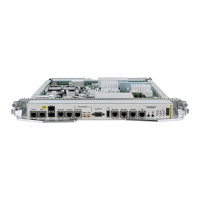•
For diagnostic/troubleshooting reasons, it may be useful to (temporarily) override the entire decapsulation
filter list.
The add function must be included in order for a PETR to “fake registers” with the Map-Server to obtain
the decapsulation filter list. The inclusion of the PETR RLOC in this command allows the PETR to
establish the reliable transport session.
Note
In this example, the Map-Server is configured to create reliable transport sessions with specific LISP sites,
to dynamically create, maintain, and distribute decapsulation filter lists. It has also been configured to modify
the dynamically created filter list (comprised of registered site RLOC addresses) with the statically configured
PxTR IPv6 RLOC address of 2001:db8:e:f::2.
router lisp
locator-set PxTR_set
2001:DB8:E:F::2
exit
!
eid-table vrf 1001 instance-id 1001
map-server rloc members modify-discovered add locator-set PxTR_set
ipv4 route-export site-registration
exit
!
---<skip>---
!
map-server rloc members distribute
!
Reset LISP TCP Reliable Transport Session
To reset the LISP TCP reliable transport session between an xTR and an MS use the clear lisp vrf command
in the EXEC mode.
SUMMARY STEPS
1.
clear lisp vrf VRF_name session {peer_address | *
DETAILED STEPS
PurposeCommand or Action
When a peer-address is specified the TCP connection to that peer
will be cleared. When the “*” option is specified all LISP reliable
transport sessions will be cleared.
clear lisp vrf VRF_name session {peer_address | *
Example:
RP/0/0/CPU0:ios#clear lisp vrf test session
*
Step 1
Verify Data Plane Security Configurations
Perform this task to verify data plane security configurations:
Cisco ASR 9000 Series Aggregation Services Router Routing Configuration Guide, Release 5.3.x
668
Implementing Data Plane Security
Reset LISP TCP Reliable Transport Session

